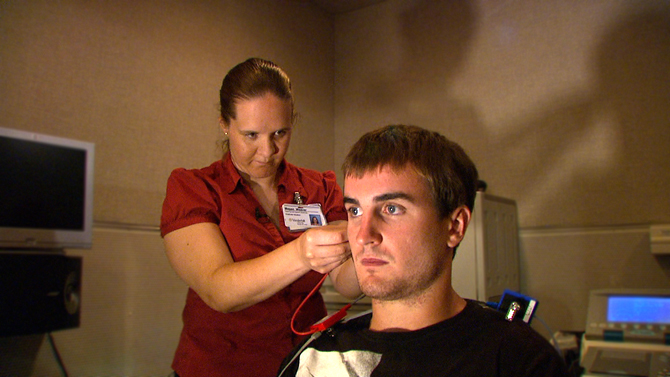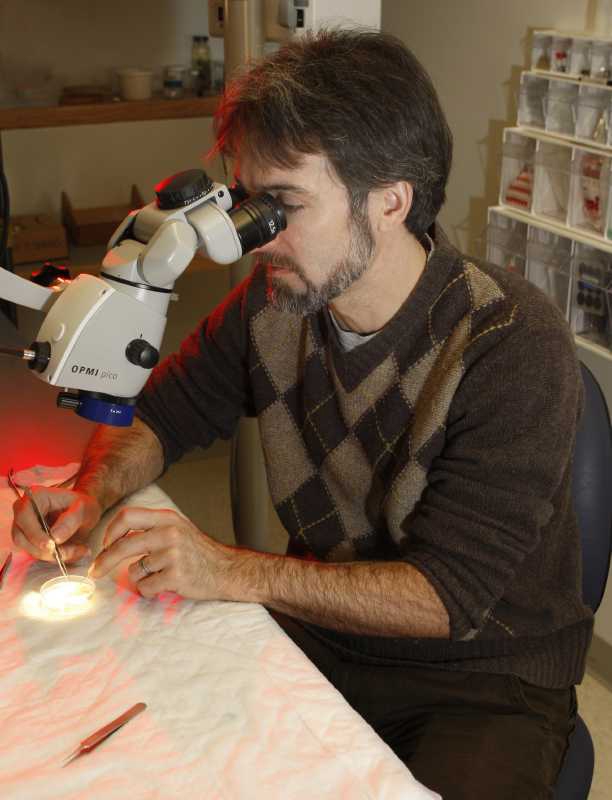Research
-

Video: Fingers detect typos even when conscious brain doesn’t
Media contact: Melanie Moran (615) 322-NEWS melanie.moran@vanderbilt.ed… Read MoreOct 28, 2010
-

Fingers detect typos even when conscious brain doesn’t
Expert typists are able to zoom across the keyboard without ever thinking about which fingers are pressing the keys. New research from Vanderbilt University reveals that this skill is managed by an autopilot, one that is able to catch errors that can fool our conscious brain. Read MoreOct 28, 2010
-

New type of liquid crystal promises to improve performance of digital displays
Bryan Ringstrand (left) and Piotr Kaszynski [Note: A multimedia version of this story is available on Exploration, Vanderbilt’s online research magazine.] Chemists at Vanderbilt University have created a new class of liquid crystals with unique electrical properties that could improve the performance of digital displays used on everything from… Read MoreOct 5, 2010
-

Vanderbilt, University of Melbourne expand ties
Vanderbilt, University of Melbourne expand ties through new research collaborations, exchange programs, office in Washington, D.C. Vanderbilt University and Australia’s University of Melbourne have taken their academic partnership to a new level – committing $500,000 in joint seed funding over the next two years for research collaborations, expanding… Read MoreSep 21, 2010
-

Vanderbilt plays key role in $20 million federal grant designed to strengthen Tennessee’s R&D infrastructure
Five years from now, high school and college students throughout Tennessee should have more and better opportunities to learn about and pursue careers in alternative energy science and technology. Read MoreSep 9, 2010
-

VUCast Extra: Study shows adolescent hearing loss high
Is exposure to loud noise, concerts and mp3 players harmful to your child’s hearing? While the exact cause is unknown, a study by Vanderbilt and Harvard researchers shows the number of young people suffering from hearing loss is increasing at an alarming rate. Find out more about this Journal of… Read MoreAug 17, 2010
-

Why can’t some people put the brakes on impulsive behavior?
A group of Vanderbilt researchers analyzed the role of the brain chemical dopamine in impulsivity to discover more precisely what makes some people more susceptible to rash behavior. Read MoreJul 29, 2010
-

Vanderbilt University study to be most comprehensive look at link between stress and health disparities
Researchers at Vanderbilt will begin a landmark study to examine how social stress contributes to disparities in health among minority populations. Vanderbilt University is launching a landmark study in Nashville to look at the role stress plays in the health disparities observed across socioeconomic status and race. The study will… Read MoreJul 6, 2010
-

Implicit bias against Latinos affects all immigrants, Vanderbilt research shows
Efren Perez Most Americans, despite their best intentions, harbor a negative bias against Latino immigrants, which deeply colors their outlook on policy proposals for immigration reform, according to research findings by Vanderbilt University political scientist Efren Perez. “I found that when the issue of immigration is broached,… Read MoreJul 1, 2010
-

Vanderbilt No. 12 on 2010 list of best places for life scientists to work
Ken Catania Vanderbilt University was named one of the best places for life scientists to work in academia by The Scientist magazine. It was the seventh time in the eight years of the survey that Vanderbilt was ranked and a substantial improvement from its 2009 ranking. Vanderbilt was ranked… Read MoreJun 30, 2010